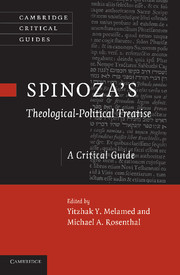Book contents
- Frontmatter
- Contents
- List of contributors
- Acknowledgments
- List of abbreviations
- Introduction
- 1 Spinoza's exchange with Albert Burgh
- 2 The text of Spinoza's Tractatus Theologico-Politicus
- 3 Spinoza on Ibn Ezra's “secret of the twelve”
- 4 Reflections of the medieval Jewish–Christian debate in the Theological-Political Treatise and the Epistles
- 5 The early Dutch and German reaction to the Tractatus Theologico-Politicus: foreshadowing the Enlightenment's more general Spinoza reception?
- 6 G. W. Leibniz's two readings of the Tractatus Theologico-Politicus
- 7 The metaphysics of the Theological-Political Treatise
- 8 Spinoza's conception of law: metaphysics and ethics
- 9 Getting his hands dirty: Spinoza's criticism of the rebel
- 10 “Promising” ideas: Hobbes and contract in Spinoza's political philosophy
- 11 Spinoza's curious defense of toleration
- 12 Miracles, wonder, and the state in Spinoza's Theological-Political Treatise
- 13 Narrative as the means to Freedom: Spinoza on the uses of imagination
- Bibliography
- Index
Introduction
Published online by Cambridge University Press: 10 January 2011
- Frontmatter
- Contents
- List of contributors
- Acknowledgments
- List of abbreviations
- Introduction
- 1 Spinoza's exchange with Albert Burgh
- 2 The text of Spinoza's Tractatus Theologico-Politicus
- 3 Spinoza on Ibn Ezra's “secret of the twelve”
- 4 Reflections of the medieval Jewish–Christian debate in the Theological-Political Treatise and the Epistles
- 5 The early Dutch and German reaction to the Tractatus Theologico-Politicus: foreshadowing the Enlightenment's more general Spinoza reception?
- 6 G. W. Leibniz's two readings of the Tractatus Theologico-Politicus
- 7 The metaphysics of the Theological-Political Treatise
- 8 Spinoza's conception of law: metaphysics and ethics
- 9 Getting his hands dirty: Spinoza's criticism of the rebel
- 10 “Promising” ideas: Hobbes and contract in Spinoza's political philosophy
- 11 Spinoza's curious defense of toleration
- 12 Miracles, wonder, and the state in Spinoza's Theological-Political Treatise
- 13 Narrative as the means to Freedom: Spinoza on the uses of imagination
- Bibliography
- Index
Summary
Spinoza's Theological-Political Treatise was a notorious book in its own time both for what it attacked and for what it advocated. Spinoza did not hesitate to call into question traditional religious – and not only religious – pieties. He attacked the common understanding of prophecy as either a privileged and supernatural form of knowledge or a disguised mode of philosophizing. He denied that miracles, as violations of the Laws of Nature, were possible and claimed that belief in them demonstrated ignorance and undermined any adequate conception of God. Just as he hoped to demystify the content of Scripture, Spinoza sought to call into question its origin. Relying on historical and linguistic analysis, Spinoza argued that Scripture is itself a human artifact written and composed by several authors and editors over time. But Spinoza was not a skeptic about all things. He claimed that prophets used their vivid imaginations to advocate obedience to a social order in which justice and charity were paramount. He believed that the political model of the ancient Hebrews could be imitated in certain key respects. Spinoza's Realpolitik – his identification of right with might – led him to rather surprising conclusions. Unlike Hobbes, whose social contract theory justified absolute monarchy, Spinoza argued that democracy was a preferred form of government. And, finally, he thought that the state would be better off if it granted limited religious toleration and the freedom to philosophize.
- Type
- Chapter
- Information
- Spinoza's 'Theological-Political Treatise'A Critical Guide, pp. 1 - 10Publisher: Cambridge University PressPrint publication year: 2010



